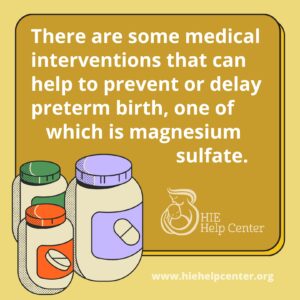Babies that are born prematurely are at an increased risk of experiencing health issues such as hypoxic-ischemic encephalopathy (HIE) and cerebral palsy (CP). This is because their organs are underdeveloped and more susceptible to damage from oxygen deprivation and other types of birth injury (1). Magnesium sulfate, an inorganic salt, can help to suppress premature labor and improve neonatal outcomes (2).
How can magnesium sulfate suppress preterm labor?
 Preterm labor occurs when the uterus begins to contract, resulting in cervical change, before 37 weeks of pregnancy. Ten percent of women who experience preterm labor give birth within the next seven days. However, there are certain medical interventions that can reduce associated risks, including magnesium sulfate.
Preterm labor occurs when the uterus begins to contract, resulting in cervical change, before 37 weeks of pregnancy. Ten percent of women who experience preterm labor give birth within the next seven days. However, there are certain medical interventions that can reduce associated risks, including magnesium sulfate.
Magnesium sulfate is a tocolytic, a medication used to suppress uterine contractions and delay preterm delivery. The exact mechanism through which it inhibits contractions is unknown, but researchers believe it likely works by lowering calcium levels in the uterine muscles. Since calcium is needed for muscles to contract, this can cause muscle relaxation (2).
Antenatal magnesium sulfate can prevent or delay preterm birth for several days or longer. While this may seem short-term, it may give medical professionals time to prepare the baby for birth by administering antenatal corticosteroids like betamethasone, which help the baby’s lungs become ready for extra-uterine life and act as a neuroprotector (2, 3).
Magnesium sulfate treatment is administered through an IV, at a dose of 4-6 grams, over a span of 15 to 30 minutes. Subsequently, a maintenance dose of 2-3 grams is given each hour (2).
Can magnesium sulfate protect the baby’s brain?
 In addition to suppressing premature labor, there is evidence that magnesium sulfate has more direct neuroprotective effects on the baby’s brain. CA Crowther and colleagues performed a meta-analysis and found that when given antenatally (to babies at high risk of preterm delivery), magnesium sulfate reduces the likelihood of cerebral palsy, as well as the combined risk of fetal/infant death or cerebral palsy (4).
In addition to suppressing premature labor, there is evidence that magnesium sulfate has more direct neuroprotective effects on the baby’s brain. CA Crowther and colleagues performed a meta-analysis and found that when given antenatally (to babies at high risk of preterm delivery), magnesium sulfate reduces the likelihood of cerebral palsy, as well as the combined risk of fetal/infant death or cerebral palsy (4).
Additionally, magnesium sulfate has been shown to reduce the risk of periventricular leukomalacia (damage to the brain’s white matter) (5) and intraventricular hemorrhage (bleeding into the brain’s ventricular system) (6).
Crowther and colleagues noted that recommendations for magnesium sulfate use have made their way into several prominent clinical practice guidelines, and that this “could lead to significant global health benefits” (4).
Is magnesium sulfate safe for all pregnant women?
 In most pregnant women, magnesium sulfate does not have dangerous side effects (provided that the medication is carefully dosed and the patient’s well-being is closely monitored). However, there are certain circumstances under which its use should be avoided. Women who have one or more of the following conditions should not receive magnesium sulfate for preterm labor (2, 7):
In most pregnant women, magnesium sulfate does not have dangerous side effects (provided that the medication is carefully dosed and the patient’s well-being is closely monitored). However, there are certain circumstances under which its use should be avoided. Women who have one or more of the following conditions should not receive magnesium sulfate for preterm labor (2, 7):
- Myasthenia gravis
- Muscular dystrophy
- Myocardial compromise
- Cardiac conduction defects
- Impaired renal (kidney) function
About the HIE Help Center and ABC Law Centers
The HIE Help Center is run by ABC Law Centers, a medical malpractice firm exclusively handling cases involving HIE and other birth injuries. Our lawyers have over 100 years of combined experience with this type of law, and have been advocating for children with HIE and related disabilities since the firm’s inception in 1997.
If you suspect your child’s birth injury may have been caused by medical negligence, contact us today to learn more about pursuing a case. We provide free legal consultations, during which we will inform you of your legal options and answer any questions you have. Moreover, you would pay nothing throughout the entire legal process unless we obtain a favorable settlement.
You are also welcome to reach out to us with inquiries that are not related to malpractice. We cannot provide individualized medical advice, but we’re happy to track down informational resources for you.
Related reading
- Preventing Premature Birth
- Cervical Cerclage
- Progesterone
- Betamethasone
- Magnesium Sulfate for Neuroprotection
Sources
- ABC Law Centers. (n.d.). Retrieved December 19, 2019, from https://www.abclawcenters.com/practice-areas/prenatal-birth-injuries/premature-birth-and-prevention/.
- Healthline (n.d.). Retrieved December 19, 2019, from https://www.healthline.com/health/pregnancy/preterm-labor–magnesium-sulfate#how-it-works
- HIE Help Center (n.d.). Retrieved December 19, 2019, from https://hiehelpcenter.org/medical/prevention/betamethasone
- Crowther, C. A., Middleton, P. F., Voysey, M., Askie, L., Duley, L., Pryde, P. G., … & AMICABLE Group. (2017). Assessing the neuroprotective benefits for babies of antenatalmagnesium sulphate: An individual participant data meta-analysis. PLoS medicine, 14(10), e1002398.
- FineSmith, R. B., Roche, K., Yellin, P. B., Walsh, K. K., Shen, C., Zeglis, M., … & Fish, I. (1997). Effect of magnesium sulfate on the development of cystic periventricular leukomalacia in preterm infants. American journal of perinatology, 14(05), 303-307.
- Petrova, A., & Mehta, R. (2012). Magnesium sulfate tocolysis and intraventricular hemorrhage in very preterm infants. The Indian Journal of Pediatrics, 79(1), 43-47.
- Simhan, H. N., & Caritis, S. (2011). Inhibition of acute preterm labor. UpToDate. Retrieved from https://www. uptodate.com/home/index.html.

